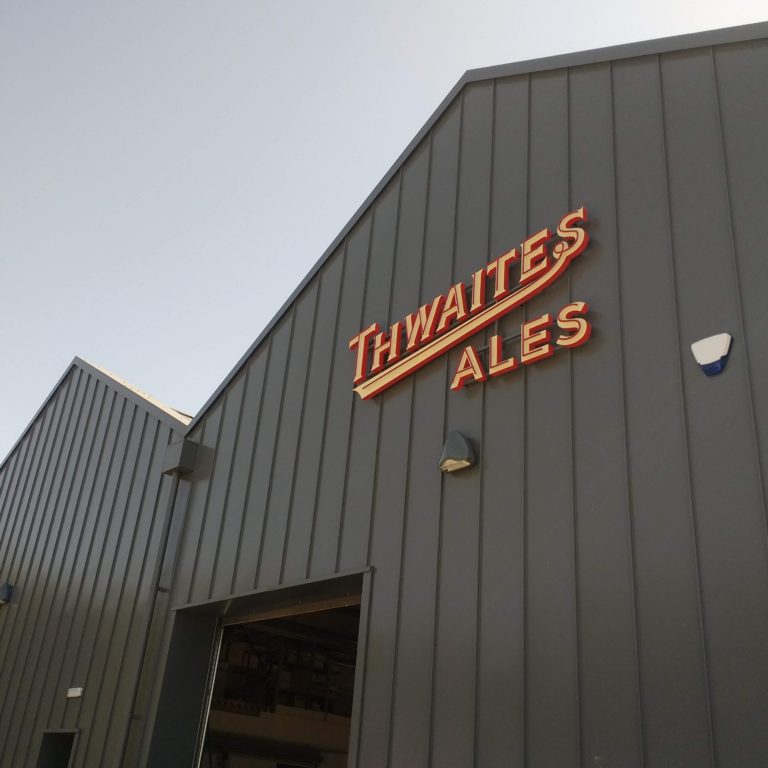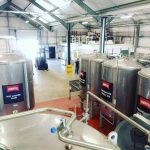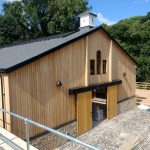In the evolving world of beer, change is the one thing you can rely on. Whether breweries are generations old or brand-spanking new, each one is growing and moving with the times in order to keep their place in a hugely competitive industry. That’s not to say the beer itself must change – although often it does. Change can come in the form of marketing plans, or equipment adaptations, or plant expansion. Some breweries thrive under the moving skies of change. Some struggle to relate to new customers and their fickle tastes. That’s business.
When Thwaites announced their plans to move to brand new purpose-built premises near Samlesbury and Mellor Brook, resulting in the closure of their Penny Street brewery in the centre of Blackburn, it underlined the fact that even breweries who’ve been mashing in for more than two hundred years are adapting to a changing market. It also posed some interesting questions about local ale and its competition with the growing number of smaller independent “craft” breweries. Some larger breweries choose to swat away the changes these indie breweries are bringing, and continue to swim against the tide with varying levels of success. Some choose to work differently. They’ve decided to realign themselves with their original core values (which funnily enough are very similar to that of modern craft breweries), working closely with a refreshed marketing strategy to make sure they aren’t left behind. Thwaites are one of these breweries.
The first thing to notice at the new Thwaites brewery is the signage they’ve chosen – a vintage design based on original Thwaites branding, scrawled like a signature over the front and back gables. It sets the tone; this brand new building, with smart new paint and fresh ideas still maintains a great deal of its heritage, and its still signed off by the gaffer.
Shaking hands with brewers Mark and Glyn, who’ve each worked for Thwaites for 15 years and 39 years respectively, I’m welcomed into the brand new brewery space. It had been in use for just four weeks at the time of my visit and it’s entire interior was shiny and spookily tidy, with reassuring yeasty smells puffing from four 20bbl and two 30 bbl fermenters and neat stacks of grain sacks piled against the south-facing wall. Floor to ceiling windows at the rear of the building let in gallons of daylight, and give uninterrupted views of the nearby ancient woodland and greenery of the Ribble Valley.
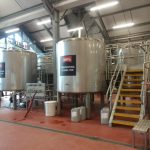

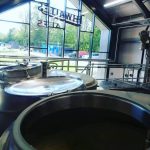 Up the ladders and looking down at the equipment, brewer Stu (14 years at Thwaites) explains the busily-fermenting brews inside, including popular pale Heritage and Cask In Glory, a seasonal beer created with cascade hops for a zingy, tropical taste especially for Cask Ale Week in September. That’s where they’re moving too – as well as keeping Original, IPA, Nutty Black and Heritage, they’re creating seasonal beers to suit drinkers’ increasing taste for variety.
Up the ladders and looking down at the equipment, brewer Stu (14 years at Thwaites) explains the busily-fermenting brews inside, including popular pale Heritage and Cask In Glory, a seasonal beer created with cascade hops for a zingy, tropical taste especially for Cask Ale Week in September. That’s where they’re moving too – as well as keeping Original, IPA, Nutty Black and Heritage, they’re creating seasonal beers to suit drinkers’ increasing taste for variety.
 Currently, and for the time being, the team at Thwaites will only be brewing cask beer. Head brewer Brian pointed out the keg equipment, which isn’t in use yet, but is hoped to be in operation in 2019. I asked about lager production for their pubs – he said that’s something they’re seriously considering, but their focus at the moment is brewing fantastic cask ale. (You heard it here first… potentially.)
Currently, and for the time being, the team at Thwaites will only be brewing cask beer. Head brewer Brian pointed out the keg equipment, which isn’t in use yet, but is hoped to be in operation in 2019. I asked about lager production for their pubs – he said that’s something they’re seriously considering, but their focus at the moment is brewing fantastic cask ale. (You heard it here first… potentially.)
“We want to get everything perfect first, and our cask is our priority at the moment,” he explained.
Thwaites cask beer is also changing the way it’s distributed, and you may have already noticed that you’re only able to find a pint of your favourite Thwaites beer in a Thwaites pub.
Brewer Mark said about the changes, “We’re still an independent brewery even after all these years, and we’ve recently taken the decision to cut out our major distributors. That means now we’re working directly with Thwaites publicans to provide beer especially for them. We hear from the owners of our pubs what’s going down well and what they’re struggling to shift and we can work with them – either by sending more of their favourite beers their way, or encouraging them and their drinkers to try the different seasonal beers and get to know them a little better.”
After meeting the relaxed, happy team, it was clear that this move has done wonders for reigniting their passion for beer. It was mentioned that brewing larger amounts of the same beer during the automation experiments of the 80s had become factory-like, and every brewer admitted they preferred to work hands-on. It’s just as well really, since everybody working in the brewery knows how to do everything and is expected to help in every way, from mashing in to using the flashy lab equipment inherited from the old Thwaites site.
Landscaping work was still going on outside, but the huge and very beautiful wooden-clad stable block is almost finished and ready to welcome the famous Thwaites shire horses soon, one of whom is still looking for a name. In any other development, this and the other buildings on-site from the Grade II listed cottage offices and the panel-glass training and heritage centrenext-door would be transformed into boutique hotel rooms or a visitors’ centre full of expensive gifts and flights of beer. Not here. The plan is, as far as anyone could tell me, to use this site as a place to work with beer. It’s a working brewery, and it plans to stay as one.
To plan your brewery business solely around the beer you brew is bold. Thwaites have decided to concentrate on what they’re good at, leaving the diversification of their assets until they’ve fully settled in, at the very least. As I said my goodbyes in the sunshine of late August, green hills glowing in the distance behind the barn-like brewery, smiling faces welcoming me back anytime, it was easy to feel optimistic about Thwaites’ plans. Time to find myself a pint of Nutty Black and raise a glass to their future.
Article from the soon or now defunct website https://northwestbeer.co.uk/2018/09/thwaites-moves-to-samlesbury/

